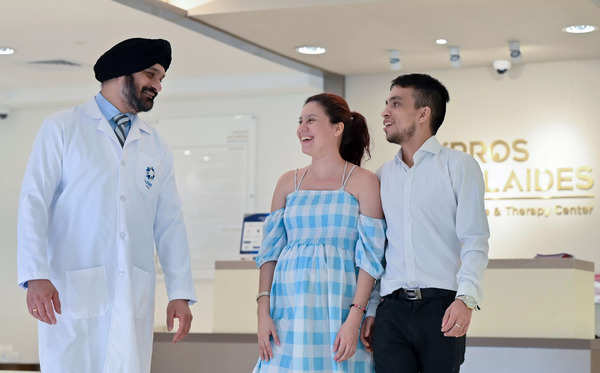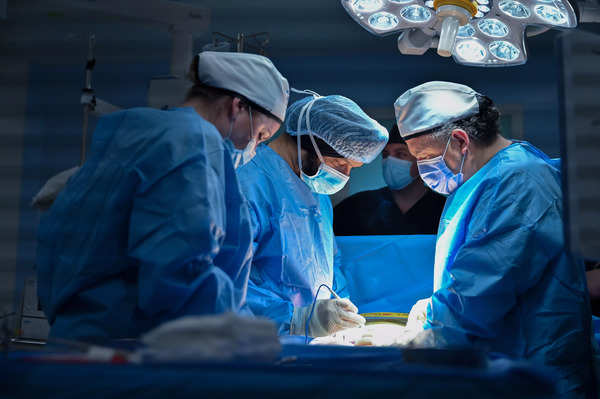“My long journey to the UAE started with my MBBS and MD medical degrees in India after which I moved to the UK in 2002 and trained as a specialist and started research in the specialised field of fetal medicine. I started practising as a specialist and expert in this branch since 2013,” the doctor, who has family roots in Mumbai, told Times of India. In the UK, Dr Singh trained under Professor Kypros Nicolaides, who is regarded as the ‘father of fetal medicine’ and worked as a consultant in fetal medicine at Fetal Medicine & Research Institute, King’s College Hospital, Denmark Hill, London.
“I was running a specialised centre in the UK for the last nine years and was also group medical director for a foundation trust. While the quality of training in my super specialisation, along with the opportunities for cutting edge research and clinical studies, in the UK was the start of a new life for me and contributed in a big way towards my career; moving to the UAE provided the opportunity to spread my wings even further. With the scope for huge exposure to new training and ideas, UAE is like the centre of the world and I have been able to do much more here than I could have done in the UK,” Dr Singh said. While UK, where he trained and worked for 22 years, offered him the facilities of research to discover answers to problems that cause long term consequences to mothers and babies; he felt that he had reached a level in his career, where it was difficult to progress to the next level.
Dr Singh with his team performing the procedure.
In the recent highly advanced procedure that Dr Singh conducted, leading a six-member medical team at the Kypros Nicolaides Fetal Medicine and Therapy Center at Burjeel Medical City; a patient from Colombia underwent a rare open spina bifida surgery in the hopes of preventing short-term and long-term complications for her baby. Dr Singh, performed in-utero fetal surgery to repair the spinal defect in the baby of 24 weeks gestation. He is now one of the few surgeons in the world trained to perform in-utero spina bifida repair.
Spina bifida is a birth defect that happens when the bones of the spine do not form and this leads to the spinal cord being left exposed to amniotic fluid, resulting in permanent disability. The in-utero repair is performed between 19-25 weeks of gestation to close the defect in the spine, thereby offering improved outcomes.
Dr Singh who is consultant, fetal medicine and obstetrics, and CEO of Burjeel Farha (division of women and children) at Burjeel Medical City feels that UAE is special and the private healthcare system sets it apart from all other global hubs in the area of medical science. “UAE has big medical centres and attracts doctors from all over the world. Geographically, Abu Dhabi and Dubai are easy to reach and about eight hours from anywhere in the world. The visa infrastructure is easy and supports medical tourism,” says Dr Singh. He adds that a government healthcare system like UK’s National Health Service is not as agile as the cutting-edge facilities that UAE’s private healthcare system offers.
“I am fortunate to be a part of the Burjeel Medical City group. While most employers are driven by profit goals, I have not heard that word in the last one year. That is an advantage when driving cutting edge research and medical procedures,” he said.

Dr Singh with the patient and her husband.
After the in-utero spina bifida repair by Dr Singh and his team, the mother is stable and expected to deliver her baby at the Abu Dhabi hospital in August. After the birth, a specialist team of neonatologists, pediatric urologists, and a pediatric orthopedic, and rehabilitation team will review the baby and plan its care.
During the fetal repair surgery, a small incision is made on the uterus and the back of the baby is exposed to allow the neurosurgeon to close the spina bifida defect, according to Dr Singh. “We use a synthetic patch to cover the defect. The amniotic fluid is then instilled back into the cavity and the uterus is closed back up. The baby will remain in the womb for the remainder of the pregnancy and will be delivered by caesarean section at 37 weeks’ gestation,” he said.
The challenge for fetal medicine is treating unborn babies in the womb because the first nine-month journey is crucial, when serious malformations or disorders could happen, Dr Singh says. “The longer the babies are exposed to such debilitating conditions, the more difficult it becomes for them to survive later. While operating inside the womb of the mother is very challenging; it can help prevent a lot of defects later in the child,” he feels. The doctor believes that while the easier thing for many couples could be to end the pregnancy if there is any disorder detected in the early stages; the option for medical treatment should be available to them.
“We were shocked after our routine 20-week scan showed that our baby’s spinal cord was not forming correctly. The option of ending the pregnancy was also discussed with us but we believe in miracles and that life is a gift of God. Our doctor suggested that our best course of action was to undergo spina bifida repair before the baby was born,” said Liz Valentina Parra Rodriguez and Jason Mateo Moreno Gutierrez, the Colombian couple who travelled to Abu Dhabi for the procedure to give their baby the best chance possible.
While in-utero spina bifida repair is not readily available everywhere and there are only approximately 14 centers that perform this complex procedure worldwide; Dr Singh is now hopeful that his team will be able to cover a big geographical spread through networks that they are building. “I have also started the process of collaborating with specialists in different institutes in India. I am hopeful that we can increase accessibility to such advanced treatment in the country, eliminating the need to travel abroad,” he said. Couples from Asia and South America usually travel to the USA and Europe to seek medical care for the condition. But it is a costly procedure, according to the families.
According to Dr Singh, the procedure is not a cure, but it could make a big difference in the child’s life after birth. “In-utero repair of spina bifida reduces motor function loss of limbs and improves outcomes. After the delivery, the baby needs follow up and, in some cases, may need to undergo physiotherapy and other medical assessments to ensure their well-being,” Dr Singh said.
